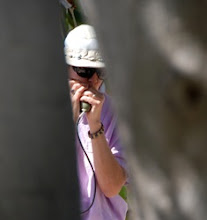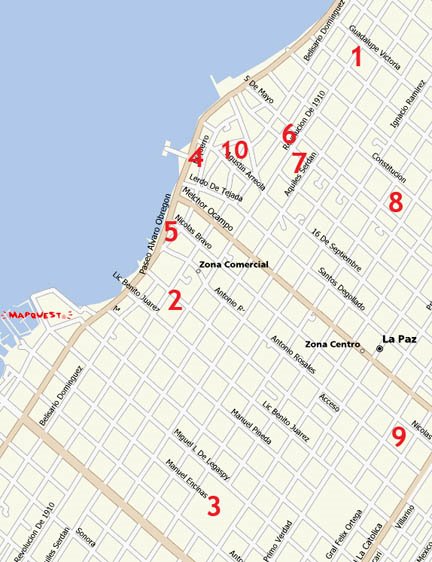
MAN BEHIND THE COUNTER
The wrought-iron signpost says Escritorio Público – Public Writing Desk. It stands in the small plaza Ignacio Cabezud across from the tourist dock in La Paz. Behind the sign, a weather-beaten stall is open for business. There’s a manual typewriter on the counter, along with pen, paper cutter and stapler. Inside, a photocopying machine pushes up against shelves that bulge with papers.
The man at the counter is Rogelio Askins Aguilar – accountant, bookkeeper and public writer. He has worked in this neighborhood for more than 30 years.
The job of public writer in Latin America is as old as the need to write a letter. Escritores públicos flourished in the days when many people were illiterate. You would find a public writing desk in the central plaza of town, at a table with ink, paper and a sign – maybe a drawing of a quill and scroll for clients who couldn’t read. The writer’s customers sought help with all kinds of paperwork: a note of apology for late payment of fees, an entreaty to an ex-wife to come home, forms to start a business, a letter to a brother gone searching for work.
There aren’t many public writing desks left like the one in the small plaza of La Paz. In an interview, I ask Rogelio about this (our conversation is in Spanish, which I have translated and summarized). Rogelio says his escritorio público could be among the last of its kind in the city. “I had a friend in another neighbourhood, but I don’t think his office is open anymore.”
Drawing on his skills as an accountant and bookkeeper, Rogelio is much more than a public writer. He helps clients with the paperwork of officialdom. This includes tax declarations, health records, immigration documents, agriculture forms, business dealings and the like. That’s the nitty gritty of his day. But after cataloguing the details of the job, he describes what he does in another way: “I do not permit the exploitation of one man by another.”
Rogelio’s office seems out of character in this gentrified plaza. On one side of his shed is the artist Wyland’s mural of wildlife in the Sea of Cortez (Mar del Cortés) . On the other side is a sales office for luxury condos. There are sculptures of sea turtles and a whimsical trio of musicians, seashells brought to life. If you take a closer look at Rogelio’s old wooden shed, you will see it is decorated with fish and figures akin to Baja’s cave paintings. He says he painted them himself, inspired by Wyland.
There is no computer in the escritorio. Rogelio has one at home, but says that here, a typewriter is more valuable. As he points out, it’s tough to use a computer to type in a missing number on a government form.
Rogelio is an old newspaper man. From somewhere beneath the counter he retrieves a pocket-sized brass plate – his press pass. He digs through piles of newsprint on the shelves behind him and emerges with a 25-year-old editorial page from the Mexico City newspaper Despertar de America (To awaken America). He is listed on the masthead as editor-in-chief.
I ask how Rogelio how old he is and get the answer, “Cinquenta” (fifty). He looks at least seventy, and my skepticism shows. He chuckles, then on a notepad he writes “50,” draws an X through it and laughs again. “Sin cuenta,” he says. Ah, a play on words. Sin means without. Cuenta means calculation or account. “¡No tengo (I don’t have) cuenta!”
And then he switches languages, using English for the first and only time during our conversation. As a former news man, he may be worried that I’ll get it wrong. “Seventy-three,” he says. “I am 73.”
Rogelio chuckles again when I ask if people still come to him for help in writing love letters. “Not so much anymore,” he says. However, he is ready for anyone who does arrive with that kind of request. “Ponemos picoretes al papel.” He smiles as he says this. I have trouble getting a definitive translation, despite asking several Spanish speakers. The best I can do: “We put little kisses –little nibbles? – to paper.”
Rogelio tells me he loves everything about his work. “I am my own boss. It’s very entertaining. Each of the people who arrives here comes with a different matter, and it must be resolved. So it’s never boring.”
When the plaza in which Rogelio works was renovated, other street stalls disappeared, making way for art work and concerts. But the government permitted Rogelio to stay, he says – “because this is a service to the community.”


